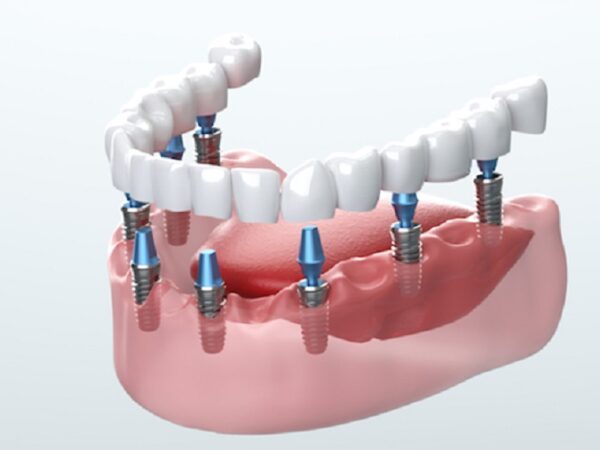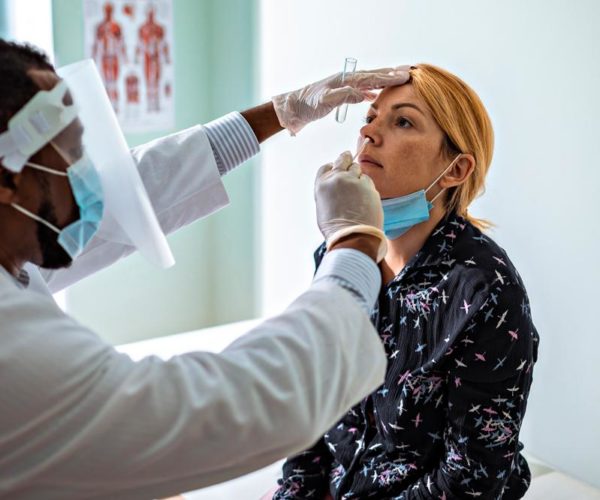Losing a tooth as an adult can be an embarrassing situation to find yourself in. Rest assured that you are not alone, and there is plenty of help available. Thanks to advances in dental technology, there are many different ways of replacing missing teeth. There are different types of tooth replacement options to suit your unique dental needs and personal preferences. The replacement can be removable or a fixed prosthetic if you prefer.
Dentures
One of the most common ways of replacing missing teeth is with dentures. A denture is a removable replacement for missing teeth and surrounding tissues, namely the gums. There are two types of dentures, complete and partial dentures; the type you need will depend on how many teeth you are replacing. The dentures can be taken out of your mouth and replaced as necessary, and although they may take a while to get used to, they are highly convenient, more comfortable to wear and aesthetically pleasing. They are great for senior patients who do not want to undergo surgery and are looking for comfort and convenience.
Bridges
Another common method of tooth replacement is with a dental bridge. A dental bridge is a fixed method of replacing a single missing tooth or multiple teeth by bonding the replacement tooth or teeth onto your adjacent healthy teeth. There will be different types of bridges available to you, depending on your unique dental needs.
Dental implants
The most popular method of replacing missing teeth is with dental implants Gordon. Dental implants have seen a surge in popularity over the last few decades. They have been used successfully since the 1960s and have an average success rate of 97%. With dental implants, you can replace one or more teeth. A single implant can replace up to 3 missing teeth, 4 to 6 implants can replace a full dental arch, and 8 to 12 implants can replace all your teeth. If most of your teeth are intact and you only need to replace a single tooth, you will be pleased to know that dental implant surgery is conservative and does not affect your adjacent healthy teeth. Instead, it strengthens the teeth, provides greater support and encourages better bone health.
Dental implants are small, titanium screws, and the surgery involves drilling a small hole into the bone socket of your missing tooth; any remaining tooth fragments will be removed, and the dental implant will be inserted directly into the hole. A healing cap may be placed on the head of the implant, and your gums will be stitched over the implant, leaving the site to heal. The titanium implant initiates a process known as osseointegration, which causes bone cells to form around the implant and fix it into place; this can be a lengthy process, taking between four and six months. However, once in place, the implant will stay there forever. You can then replace your missing teeth with a crown or a set of partial or full dentures, depending on how many teeth you want to replace.
Dental implants are thought to be the next best thing to natural teeth. Therefore you need to speak to your dentist and find out whether you are eligible for dental implant surgery; if you are, you should replace your missing teeth as soon as possible to prevent the complications of tooth loss.
Effects of tooth loss
To begin with, tooth loss can have a huge impact on the appearance of your smile, changing the shape of your mouth and face and making you look older than you actually are. It can affect your self-confidence and self-esteem and harm your mental health and well-being. Tooth loss can also affect the function of your mouth, and you may not be able to eat your favourite foods. If your front teeth are missing, your speech can be affected. Missing teeth can also cause receding gums and bone loss; this can cause further complications such as more missing teeth.
With dental implants, you can prevent these complications. The implant is strong and sturdy and will strengthen your jaw bone, providing support for the adjacent teeth and helping to prevent further tooth loss. With dental implants, you will forget that you ever had any missing teeth.
Disclaimer
Any surgical or invasive procedure carries risks. Before proceeding, you should seek a second opinion from an appropriately qualified health practitioner.




